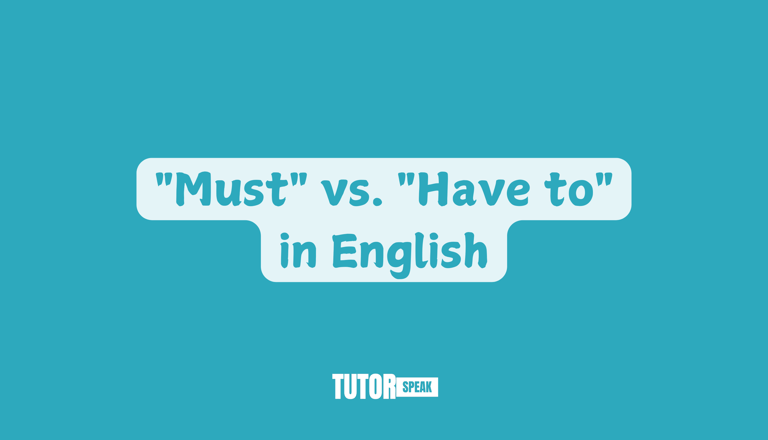Must vs. Have To in English
"Must" and "Have to" are modal verbs used to express necessity or obligation. While they are often used interchangeably, there are subtle differences in their meaning and usage.
TutorSpeak
12/17/20242 min read


Must vs. Have To
"Must" and "Have to" are modal verbs used to express necessity or obligation. While they are often used interchangeably, there are subtle differences in their meaning and usage.
Must
Expresses personal obligation or necessity: The speaker imposes the obligation on themselves or others. It often implies a stronger sense of obligation or duty.
Example: "I must finish my homework before going out."
Used for strong recommendations or advice: It indicates something that is important to do.
Example: "You must try this cake; it’s amazing!"
Used for rules or laws: When referring to official requirements, "must" implies something that is mandatory.
Example: "All passengers must wear seat belts."
Have to
Expresses external obligation or necessity: This form of obligation comes from an external source, such as rules, circumstances, or other people.
Example: "I have to go to work at 9 a.m."
Used for general obligations or requirements: "Have to" is more common in everyday situations, and it can refer to situations that are necessary or required.
Example: "You have to clean the kitchen after dinner."
Can be used to indicate routine: "Have to" is often used when referring to obligations that are part of normal daily life or routine.
Example: "I have to make breakfast every morning."
Key Differences:
Must is often used when the obligation is personal or self-imposed, while have to refers to external obligations.
Must is more formal and can carry a sense of urgency or stronger necessity.
Have to is more common in everyday speech and refers to obligations imposed by outside factors.
Exercises
1. Choose the correct modal verb (Must or Have to):
I ______ finish this report by tomorrow.
You ______ wear a helmet when riding a bike.
She ______ go to the dentist for a checkup.
We ______ leave early if we want to catch the train.
They ______ be at the airport by 3 p.m.
2. Fill in the blanks with must or have to:
I ______ buy groceries today because we have none left.
You ______ speak quietly in the library.
He ______ clean his room before going out with friends.
The workers ______ complete the task by the deadline.
I ______ call my mom when I get home.
3. Rewrite the sentences using must or have to:
It’s necessary to arrive at least an hour before the flight.
It’s my responsibility to attend the meeting tomorrow.
We’re required to bring identification for entry.
It’s important that you complete the assignment by Friday.
I don’t have a choice but to attend the conference next week.
4. Correct the sentence if needed:
You must to wear a uniform at the office.
I have to go to the dentist, I have an appointment.
He must to leave early tomorrow for his flight.
I must to study for my exam tonight.
They have to helps with the project this weekend.
5. True or False:
Must is used for obligations imposed by others.
Have to is used for personal obligations.
Must can express strong advice or recommendations.
Have to is more formal than Must.



